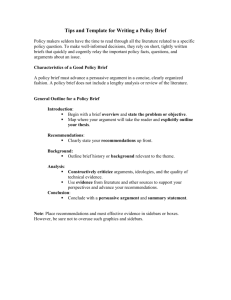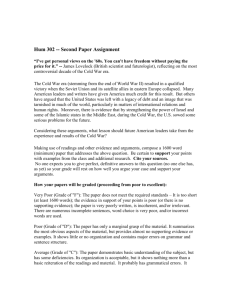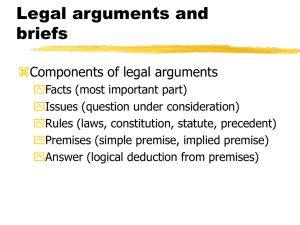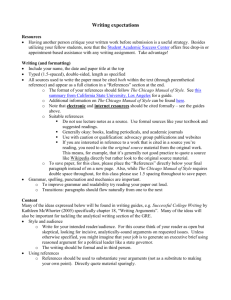Instructor: Professors Pyle & Dombronski Section:
advertisement
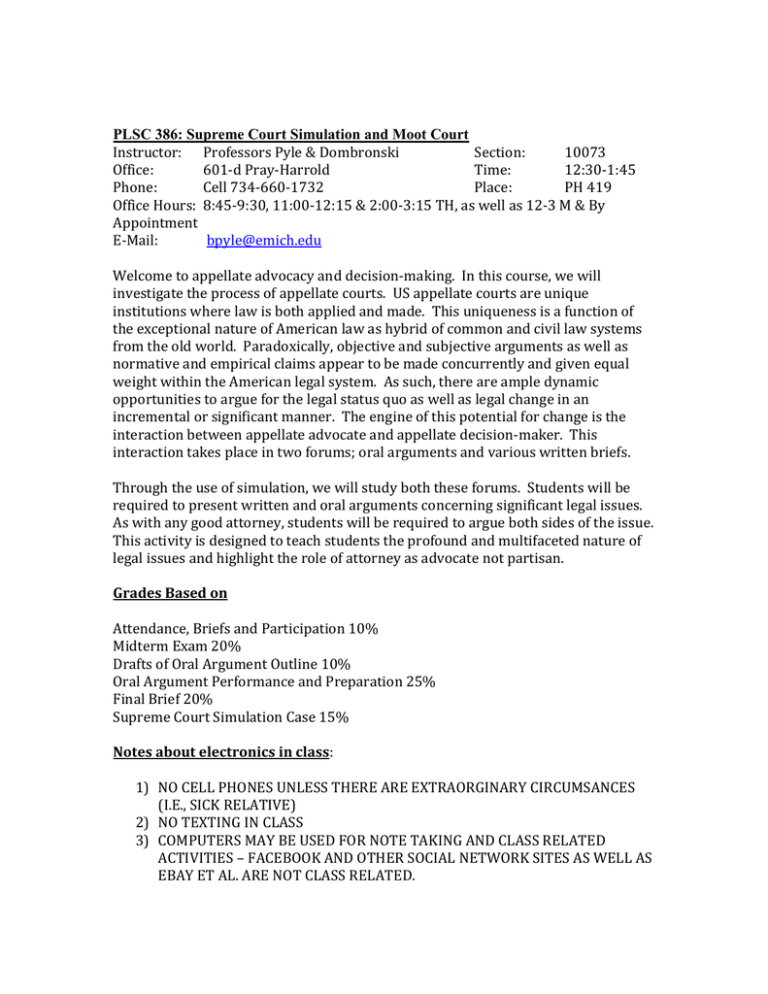
PLSC 386: Supreme Court Simulation and Moot Court Instructor: Professors Pyle & Dombronski Section: 10073 Office: 601-d Pray-Harrold Time: 12:30-1:45 Phone: Cell 734-660-1732 Place: PH 419 Office Hours: 8:45-9:30, 11:00-12:15 & 2:00-3:15 TH, as well as 12-3 M & By Appointment E-Mail: bpyle@emich.edu Welcome to appellate advocacy and decision-making. In this course, we will investigate the process of appellate courts. US appellate courts are unique institutions where law is both applied and made. This uniqueness is a function of the exceptional nature of American law as hybrid of common and civil law systems from the old world. Paradoxically, objective and subjective arguments as well as normative and empirical claims appear to be made concurrently and given equal weight within the American legal system. As such, there are ample dynamic opportunities to argue for the legal status quo as well as legal change in an incremental or significant manner. The engine of this potential for change is the interaction between appellate advocate and appellate decision-maker. This interaction takes place in two forums; oral arguments and various written briefs. Through the use of simulation, we will study both these forums. Students will be required to present written and oral arguments concerning significant legal issues. As with any good attorney, students will be required to argue both sides of the issue. This activity is designed to teach students the profound and multifaceted nature of legal issues and highlight the role of attorney as advocate not partisan. Grades Based on Attendance, Briefs and Participation 10% Midterm Exam 20% Drafts of Oral Argument Outline 10% Oral Argument Performance and Preparation 25% Final Brief 20% Supreme Court Simulation Case 15% Notes about electronics in class: 1) NO CELL PHONES UNLESS THERE ARE EXTRAORGINARY CIRCUMSANCES (I.E., SICK RELATIVE) 2) NO TEXTING IN CLASS 3) COMPUTERS MAY BE USED FOR NOTE TAKING AND CLASS RELATED ACTIVITIES – FACEBOOK AND OTHER SOCIAL NETWORK SITES AS WELL AS EBAY ET AL. ARE NOT CLASS RELATED. 4) VIOLATIONS OF THESE POLICIES WILL RESULT IN POINTS BEING DEDUCTED FROM YOUR PARTICIPATION GRADE (10% REDUCTION PER INFRACTION-Yes I am serious). Important Dates 9/9/14 Last date to add courses via the web (a) 10/24/14 Last date to add courses with departmental authorization Last date for 100% tuition refund and census date (individual or total withdraw 9/12/14 from term) 11/11/14 Last date for individual class withdrawal (with W grades) - No Refund 9/29/14 Last date for 50% tuition refund (total withdrawal only) with W grades 10/24/14 Last date for 25% tuition refund (total withdrawal only) with W grades 12/11/14 Last date for total withdrawal from term (with W grades) - No Refund 9/12/14 Last date to declare pass/fail grading option or select to audit a course 12/11/14 Last date to remove pass/fail grading option and receive letter grade REQUIRED TEXTS: The following book is required reading in this course. Scalia and Garner. 2008. Making Your Case: The Art of Persuading Judges. Thompson: West. St. Paul, Mn. Three additional notes: 1) There are outside readings listed in the syllabus. I will also address numerous topics and subjects outside the text and the readings. Accordingly, if you choose not to come to class, your grade will suffer. 2) The reading for this course is relatively long and it is not easy. To do well in this course, you will have to prepare for every class by reading once before class and possibly a second time after class. 3) I reserve the right to provide additional material. 4) You must take notes or the exams will be very difficult. STUDENT RESPONSIBILITIES: Again, the required reading for this course is limited. As such, students are expected to keep up with the assigned readings and prepare for each class. This means coming to class prepared to follow the lecture, ask questions, and engage in class discussions. To help you with preparation and participation, I will take attendance and administer short quizzes when necessary. Students are responsible for all the materials presented in the lectures and the texts. While the lectures and the texts will often overlap, some material will be exclusive to either source. Thus, to perform well on the exam, it is essential that you attend class, take notes, and do the required readings. Students are required to take the examinations and turn in written work on the dates given in the course outline and in class. Participation will be discussed the first week of class (points will be awarded for active participation in class (i.e., make yourself known to me). I will not take attendance very day but I will on multiple occasions throughout the semester. Those with reasonable excuses will not lose points. I have given people zero points for class participation so you should not view it as a free gift. I do not like to give makeup exams and I will not give one unless you notify me at least one class period in advance and have a valid excuse that can be verified. I also understand that emergency situations may arise. These will be dealt with on an individual basis. Unless otherwise specified, if you hand in the take home question or essay late, it will be penalized at the rate of one letter grade a day (e.g., A becomes a B). I am very understanding and accommodating when it comes to special needs and the necessity to miss class because of religious or personal reasons; nevertheless, I cannot be understanding unless you notify me about the reason for your absence or special needs. Finally, please come and meet with me during my office hours or by appointment to discuss any questions, problems, or difficulties related to the course or anything else. I am more than willing to help you in any way I can. However, I cannot help you unless you ask. Grading Scale Grading Scale will be as follows: A 100-94 A- 93-90 B+ 89-87 B 86-84 B- 83-80 C+ 79-77 C 76-74 C- 73-70 D+ 69-67 D 66-64 D- 63-60 A Brief Word of Warning In addition to completing the required assignments on time, students will be required to answer any and all questions in their own words. That is, cutting and pasting answers from any source, without proper citation, is a form of plagiarism and will not be accepted. Any assignments that are completed in this way will NOT be given credit and can result in disciplinary action by the University. Answers that are copied, with proper citation, will not receive full credit. Please see the University's policy on plagiarism and academic dishonesty at http://www.emich.edu/studentconduct/facultylinks/academic_integrity.php Judicial Services defines plagiarism as "Plagiarism - deliberate and knowing use of someone else’s work or ideas as one’s own. Examples of plagiarism are: quoting a source verbatim, or paraphrasing text from a given source, without properly citing the source; turning in a research paper that was written by someone else; or in any other way passing off someone else’s work as one’s own; or failing to give credit for ideas or materials taken from someone else." The Halle Library site contains more information about plagiarism and integration of sources at http://www.emich.edu/library/help/integratingsources.php If you need assistance for any reason please contact me directly COURSE SCHEDULE: We will follow this outline as closely as possible. Any changes in the dates of the lecture topics, written work and examinations will be announced at least one week in advance. It is a good rule of thumb that we will cover about three or four cases a class period. I will indicate when we will cover outside readings September: Introduction to Moot Court and Appellate Law 4 Class Introduction: A Work in Progress An Introduction to Moot Court: Oral Argument and Brief Writing Constructing an Appellate Case and Party Brief 9 S&G 1-55 – As background - NOT ON EXAM An Introduction to the notion of Law as both Subjective and Objective: A Realistic Application of the Judicial Myth – or Going through the Motions & Lets look at the Case at Hand Introduction to Abortion Jurisprudence 11 Case Facts of Issue I. Griswold v. Connecticuit, Roe v. Wade (All Brief Case), Webster v. Reproductive Health & Hodgson v. Minnesota 16 S&G 137-200 - Planned Parenthood v. Casey (All Brief Case) – Including Party Briefs and selected amici (Prepping Practice Orals) 18 Stenberg v. Carhart, Gonzales v. Carhart & Planned Parenthood v. Rounds 23 Re-Argue Plan Parenthood v. Casey – Groups and Split Class – Graded 28 S&G 57-136 Introduction to Free Speech Jurisprudence 30 Facts of Issue II: Wooley v. Maynard (All Brief Case), Con Ed Co. v. Pub. Serv. Comm’n, Cet Hudson Gas v. Pub. Serv. Comm’n October: 2 Teams Chosen: Accountant’s Soc. of Va. V. Bowman, Fla. Bar v. Went for It, Inc. (All Brief Case and Party Briefs) & Conant v. Walters 7 Pickup v. Brown, Tex. Med Providers v. Lakey & Stuart v. Loomis 9 Exam on Cases and S&G – Midterm Exam 30% 14 Review of Oral Argument and Written Brief Instructions 16 Meet in Issue Groups to Compose Oral Argument Strategies 21 First Draft of Oral Argument Outline Begin Running Arguments and honing 23 Continue Arguments and honing 28 Polish Arguments within Issue Areas: Readings Do's and Don'ts Delivering Oral Arguments Your First Appellate Argument 30 Polish Arguments within Issue Areas: Readings Tips for Becoming a Better Appellate... Winning Moot Court November 4 Second Draft of Oral Argument Outline 6 Team Practices – Feedback and Graded 11 Team Practices – Feedback and Graded 13 Game ON - Final Preparation for Competition – Feedback and Graded 18 Review S&G 57-136 Begin Brief Writing Competition – Select Supreme Court case for oral arguments at end of semester from those docketed for oral arguments – may also argue cases currently in Federal Appeals Court or State High Courts 20 Work on Supreme Court Argument and put brief in final format 25 Continue December 2 Submit Final Briefs Due – Top Four to be submitted to competition. 4 Supreme Court Simulation 9 Supreme Court Simulation 11 Supreme Court Simulation 16 Supreme Court Simulation

